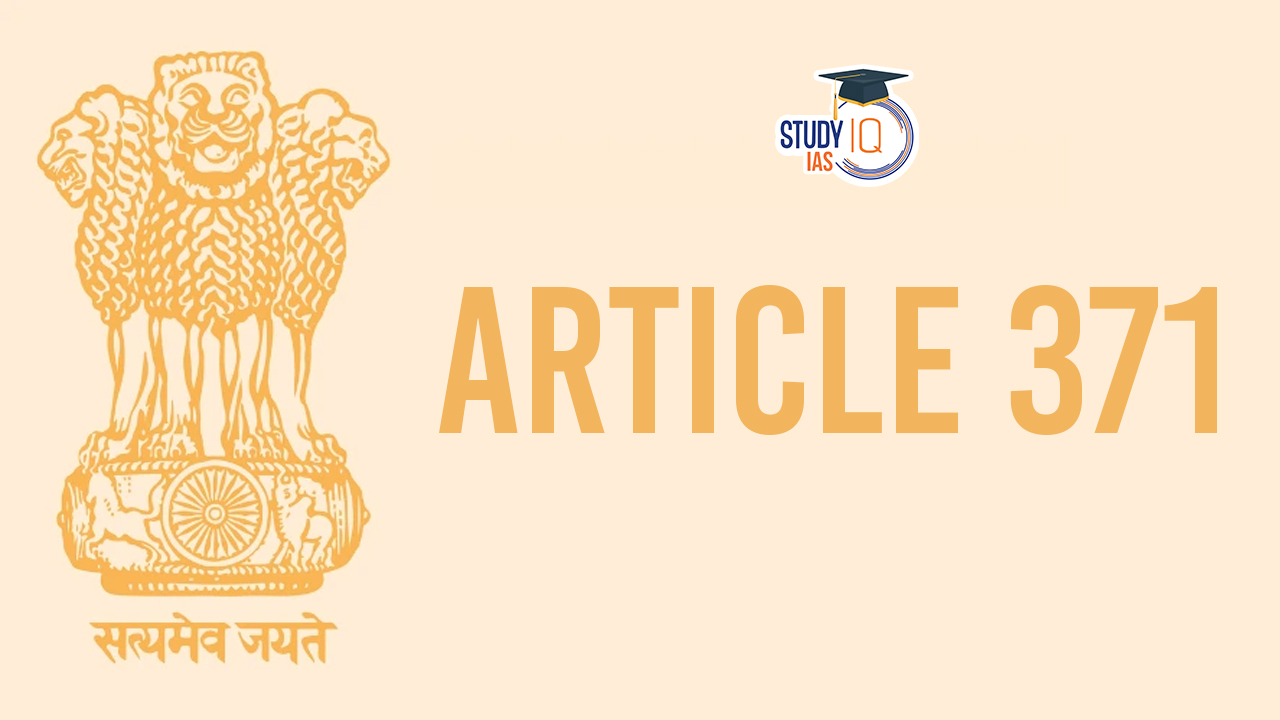Table of Contents
Context: Amid protests in Ladakh, the Indian government is contemplating granting protections similar to Article 371 to the Union Territory, safeguarding local interests in land, jobs, and culture.
About Article 371 and the Sixth Schedule
- Article 371 of the Constitution includes special provisions for 11 states, including six of the Northeast.
- For instance: Article 371A prohibits non-residents from buying land in Nagaland, which may only be bought by tribals, residents of the state.
- The Sixth Schedule of the Constitution under Article 244 has provisions for formation of autonomous administrative divisions within a state, with certain legislative, judicial and administrative autonomy.
What is Article 371 of the Indian Constitution?
Article 371 of the Indian Constitution is a provision that grants special provisions to certain states and regions of India. It falls under Part XXI of the Constitution, which deals with temporary, transitional, and special provisions. Article 371, along with its sub-sections (A through J), offers specific protections and privileges to various states, particularly those with distinct cultural, linguistic, or tribal characteristics. These provisions aim to address regional disparities, protect local customs and practices, and ensure the socio-economic development of these regions while respecting their unique identities.
Article 371 serves as a tool for decentralized governance, allowing states to have autonomy over certain aspects of administration, lawmaking, and resource management. It acknowledges the diversity of India and provides a framework for accommodating the needs and aspirations of different communities and regions within the country.
We’re now on WhatsApp. Click to Join
Key Features of Article 371
- Special Provisions for Different States: Article 371 encompasses several sub-sections, each tailored to address the unique requirements of specific states. These provisions range from protecting customary laws and practices to ensuring adequate representation and autonomy in governance.
- Protection of Local Laws and Customs: One of the key aspects of Article 371 is the protection of local laws, customs, and traditions. It prohibits the imposition of laws that may interfere with the social, religious, or customary practices of certain communities without the concurrence of the state legislature.
- Reservation in Legislative Bodies: Article 371 also provides for reservations in legislative bodies to ensure adequate representation for various communities, especially those belonging to Scheduled Tribes and other marginalized groups.
- Autonomy over Governance: Certain sub-sections of Article 371 grant states the authority to have a say in matters related to governance, land ownership, and administration. This autonomy allows states to address local issues effectively while promoting inclusive development.
- Safeguards for Tribal Areas: Article 371 includes provisions specifically aimed at protecting the rights and interests of tribal communities residing in certain regions. These safeguards are essential for safeguarding the socio-economic well-being of tribal populations and preserving their cultural heritage.
Part XXI of the Constitution of India
Part XXI of the Constitution of India contains temporary, transitional, and special provisions that are crucial for the functioning and governance of the country. This part comprises various articles that address specific circumstances, historical legacies, and unique characteristics of certain states and regions within India. Among the provisions included in Part XXI are Article 371 and its sub-sections, which offer special protections and privileges to particular states and territories.
Let’s explore the significance of Part XXI of the Constitution in the context of Ladakh, Article 371, and the Sixth Schedule of the Constitution. We’ll delve into the implications of these provisions for the governance, development, and preservation of the cultural heritage of Ladakh.
Ladakh, Article 371, and the Sixth Schedule of the Constitution
Ladakh, a region of strategic and cultural significance, has been at the center of discussions regarding its constitutional status and governance framework. With the repeal of Article 370 in August 2019 and the subsequent creation of Ladakh as a separate Union Territory (UT) without a legislature, questions have arisen regarding the application of special provisions and safeguards to address the region’s unique needs and concerns.
Ladakh’s Constitutional Status
Ladakh’s transition into a separate Union Territory marked a significant shift in its governance structure. Unlike other Union Territories like New Delhi and Pondicherry, which have their own Legislative Assemblies, Ladakh was designated as a UT without a legislature. This has raised concerns among local communities about representation and decision-making authority.
Article 371
Article 371 of the Indian Constitution provides special provisions for certain states and regions to address their specific socio-cultural and developmental requirements. While Article 371 does not directly apply to Ladakh, its sub-sections offer insights into the type of protections and privileges that can be extended to regions with unique characteristics.
The Sixth Schedule of the Constitution
The Sixth Schedule of the Constitution contains provisions regarding the administration of tribal areas in select states, including Assam, Meghalaya, Tripura, and Mizoram. Organizations like the Leh Apex Body (ABL) and the Kargil Democratic Alliance (KDA) have advocated for Ladakh’s inclusion under the Sixth Schedule to establish Autonomous District and Regional Councils (ADCs and ARCs). These bodies would possess legislative powers over critical areas such as forest management, agriculture, and social customs, thereby addressing local needs and priorities.
Implications and Considerations
The decision not to include Ladakh in the Sixth Schedule while offering Article 371-like protections raises questions about the adequacy of safeguards and autonomy granted to the region. While Article 371 provisions may offer certain protections, they may fall short of addressing Ladakh’s complex socio-economic and cultural dynamics. Furthermore, the exclusion of Ladakh from the Sixth Schedule underscores the need for alternative mechanisms to empower local communities and ensure meaningful representation in decision-making processes.


 Mechanisms to Combat Judicial Corruption...
Mechanisms to Combat Judicial Corruption...
 Registrar General and Census Commissione...
Registrar General and Census Commissione...
 Ambedkar Jayanti 2025: Biography, Legacy...
Ambedkar Jayanti 2025: Biography, Legacy...





















